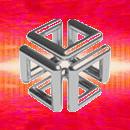So, I tried the AUA-3020 on a Fuel, no dice - but it apparently works on an O2. So of course that got me to thinking...
I had a QLA2212 here (which also does not work on a Fuel), the reason being that the AUA3020 and the QLA2212 (basically 2 QLA2200's-on-a-card) both use PCI bridge chips to map two devices into a single PCI slot, and apparently PCI bridge chips do not play well with XIO-based systems . So that got me to thinking some more...
So I put the QLA2212 (should be the same with a QLA2202, they're basically the same cards) into the PCI slot on this O2, and voila - 2 FC-AL interfaces! This also explains Ian's recent observation about one of the Adaptec 4-port SCSI cards working, I'd bet dollars to donuts that it's basically a version of the card which has two separate SCSI interfaces with a bridge chip (3 chips) as per his warning that it is " this version from the picture " that works.
Anyways, the dual-port Qlogic card shows up as two discrete interfaces, and should be able to pull some fairly good bandwidth - though I don't have a scratch-array handy to do some testing right at the moment, but will try to do the test in the next couple of weeks. Should be able to easily max out whatever bandwidth the PCI slot can provide in an O2, as 64-bit PCI-33 theoretically can push 266 MB/sec, though I don't think that you'd get nearly that much with an O2. It also doesn't require weird drivers, nor case hacking - basically stuff it in, Irix automatically "reconfigures the kernel" and on your next boot-up, you have two interfaces! Woot!


Here's the hinv after the card was installed and the system rebooted:
Cheers!
I had a QLA2212 here (which also does not work on a Fuel), the reason being that the AUA3020 and the QLA2212 (basically 2 QLA2200's-on-a-card) both use PCI bridge chips to map two devices into a single PCI slot, and apparently PCI bridge chips do not play well with XIO-based systems . So that got me to thinking some more...
So I put the QLA2212 (should be the same with a QLA2202, they're basically the same cards) into the PCI slot on this O2, and voila - 2 FC-AL interfaces! This also explains Ian's recent observation about one of the Adaptec 4-port SCSI cards working, I'd bet dollars to donuts that it's basically a version of the card which has two separate SCSI interfaces with a bridge chip (3 chips) as per his warning that it is " this version from the picture " that works.
Anyways, the dual-port Qlogic card shows up as two discrete interfaces, and should be able to pull some fairly good bandwidth - though I don't have a scratch-array handy to do some testing right at the moment, but will try to do the test in the next couple of weeks. Should be able to easily max out whatever bandwidth the PCI slot can provide in an O2, as 64-bit PCI-33 theoretically can push 266 MB/sec, though I don't think that you'd get nearly that much with an O2. It also doesn't require weird drivers, nor case hacking - basically stuff it in, Irix automatically "reconfigures the kernel" and on your next boot-up, you have two interfaces! Woot!



Here's the hinv after the card was installed and the system rebooted:
Code: Select all
LilDude 1% hinv -vvm
CPU: MIPS R5000 Processor Chip Revision: 2.1
FPU: MIPS R5000 Floating Point Coprocessor Revision: 1.0
1 200 MHZ IP32 Processor
Main memory size: 256 Mbytes
Secondary unified instruction/data cache size: 1 Mbyte on Processor 0
Instruction cache size: 32 Kbytes
Data cache size: 32 Kbytes
FLASH PROM version 4.18
Integral SCSI controller 0: Version ADAPTEC 7880
Disk drive: unit 1 on SCSI controller 0 (unit 1)
CDROM: unit 4 on SCSI controller 0
Integral SCSI controller 1: Version ADAPTEC 7880
Integral SCSI controller 3: Version Fibre Channel QL2200A, 33 MHz PCI
Integral SCSI controller 4: Version Fibre Channel QL2200A, 33 MHz PCI
On-board serial ports: tty1
On-board serial ports: tty2
On-board EPP/ECP parallel port
CRM graphics installed
Integral Ethernet: ec0, version 1
Iris Audio Processor: version A3 revision 0
PCI Adapter ID (vendor 0x9004, device 0x8078) PCI slot 1
PCI Adapter ID (vendor 0x9004, device 0x8078) PCI slot 2
PCI Adapter ID (vendor 0x1011, device 0x0026) PCI slot 3
PCI Adapter ID (vendor 0x1077, device 0x2200) PCI slot 4
PCI Adapter ID (vendor 0x1077, device 0x2200) PCI slot 5
Video: MVP unit 0 version 1.4
AV: AV1 Card version 1, Camera not connected.
Vice: TRE
Cheers!
 <>
<>



 x2+
x2+

 x3
x3
 x2
x2
 x2+
x2+

 x2
x2
 x3
x3
 x2+
x2+
Once you step up to the big iron, you learn all about physics, electrical standards, and first aid - usually all in the same day



 (<-EMXI/IO6G)
(<-EMXI/IO6G)





